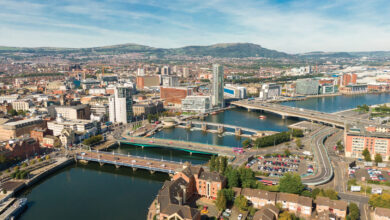A good cut
The Economic Reform Group has called for Northern Ireland to follow the Republic with a cut in corporation tax to 12.5 per cent. While there will be an initial shortfall, the region could be better off in the long term.
“Twelve years after the Good Friday Agreement,” the Economic Reform Group states, “Northern Ireland still remains the UK’s poorest region.” With the smallest private sector in the UK, it claims the most effective way to turn the economy here round quickly is a low rate of corporation tax.
At present, Northern Ireland relies heavily on a significant grant from the Treasury, to the extent that half of all government spend in Northern Ireland is financed by GB-based taxpayers. Taxation is not a devolved matter and thus is common across the board.
This is not the first time the call for a cut in the rate has been made. In December 2007, when the Varney Review was being conducted, all the parties on the hill made the request. It was not, however, among the recommendations made by Sir David.
Given that most businesses, especially those with export potential do receive “generous” grants or subsidies, the group believes that the local economy will be difficult to turn round. It also warns that from 2013 those investment grants may not be permitted at all after EU plans, which will reduce grants’ ceiling, will come into play.
By way of comparison, the Republic reduced its rate in 2003 and experienced a mass influx on foreign direct investment. The report points out, however, that a lower rate here would also benefit local companies as they would be encouraged to grow.
The decrease, it is argued, would create “at least 90,000 jobs” in the province, most of which would have a salary above the average wage here.
While not actively encouraged by the European Commission, reduced tax rates were declared legal in 2006 in the Azores and Gibraltar judgements in the European Court, so long as the void was shouldered by the region and not the national government. The group cites the reduction in revenue for the Executive to be around 2 per cent, though Varney estimated 1-1.5 per cent. That 2 per cent figure could, it argues, be smaller if the tax base expands as fast as it has in other regions following a reduction.
Adjustmentsm
The drop to 12.5 per cent would mean Northern Ireland having the joint-lowest rate in the EU. This, it says, could be achieved simply by devolving corporation tax revenues to the Executive in return for annual adjustments in the block grant which reflect the fact that those revenues will be handed over to the Executive by the Treasury. So while an agreed figure would then be deducted from the block grant, Northern Ireland would gain the corporate tax revenue raised in the province.
Allowing for further fiscal autonomy, the Executive could then adjust its own expenditure according to its change in income.
Only when the Executive reduced the rate, would its income be reduced. That amount is “uncertain” and depends very much on what rate the Executive decides on (though the group recommends 12.5 per cent).
Assuming any initial reduction in corporation tax does lead to a loss of income, the report says the Executive would need to make an equivalent reduction in spending, adding that “some short to medium pain” could be necessary for longer-term gains. Indeed data used by the group shows that there would be a cumulative loss for 11 years, before revenue would become “increasingly positive”.
Interestingly, the report does say by way of an example that if the loss in corporate tax income hit £200 million, it could actually equate to two-thirds of the Fiscal imbalances (tax revenues less expenditure) in UK regions annual under-spend by the government departments, which range from £210 million to £382 million.
Taking a step away from the purely local angle, it is likely that there would be a loss of revenue to the UK as a whole as firms would likely relocate to Northern Ireland to take advantage of the rate. Indeed the report also states that the Treasury could, rightly, argue that the deduction from the block grant should be increased each year to take account of rising corporate tax revenues.
Sir David Varney warned back in 2007 that the move could lead to brass plating, whereby a company will set up in a region but have no real activity in it and yet shift profits to its office there, thus benefitting from the lower rate. However the group says that HMRC already has a process in place to police such behaviour simply by monitoring companies.
Enterprise Committee Chair and SDLP spokesman Alban Maginness said: “The SDLP supports, in its manifesto, a cut in corporation tax in order to boost economy and create jobs in the longterm. We welcome [the] announcement by the Northern Ireland Economic Reform Group and welcome a strong debate on the issues that relate to the strengthening of our local economy.”
A DFP spokeswoman told agendaNi that any change to the corporation tax rate here would require legislation to be passed in Westminster, along with the approval both the Assembly and Executive but importantly, also the European Commission.
Even if the policy were agreed by those four parties, the department expects that it would then be subject to various legal challenges from the other UK regions.
|
Region |
2007-08 |
2008-09 |
|
South East |
18.0 |
10.1 |
|
Greater London |
15.5 |
4.2 |
|
Eastern |
6.1 |
0.7 |
|
Scotland |
-3.8 |
-3.2 |
|
East Midlands |
-1.0 |
-5.2 |
|
Northern Ireland |
-7.9 |
-9.3 |
|
North East |
-7.1 |
-9.4 |
|
South West |
-6.1 |
-10.7 |
|
West Midlands |
-6.1 |
-10.9 |
|
Yorkshire & the Humber |
-7.9 |
-12.6 |
|
Wales |
-9.8 |
-12.7 |
|
North West |
-12.1 |
-19.0 |
|
UK |
-34.4 |
-78.8 |





